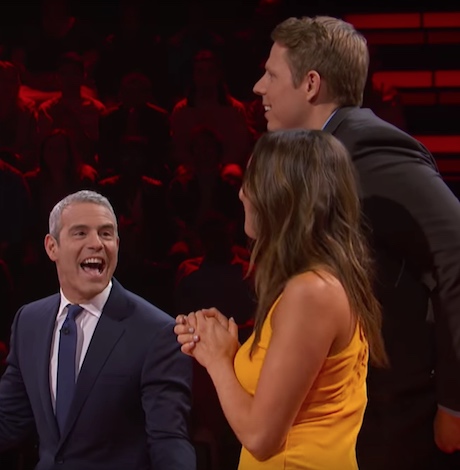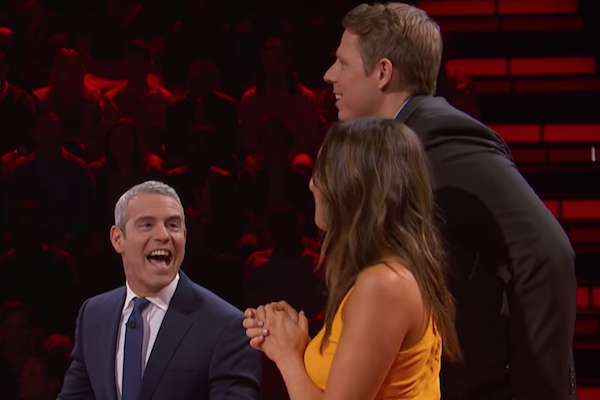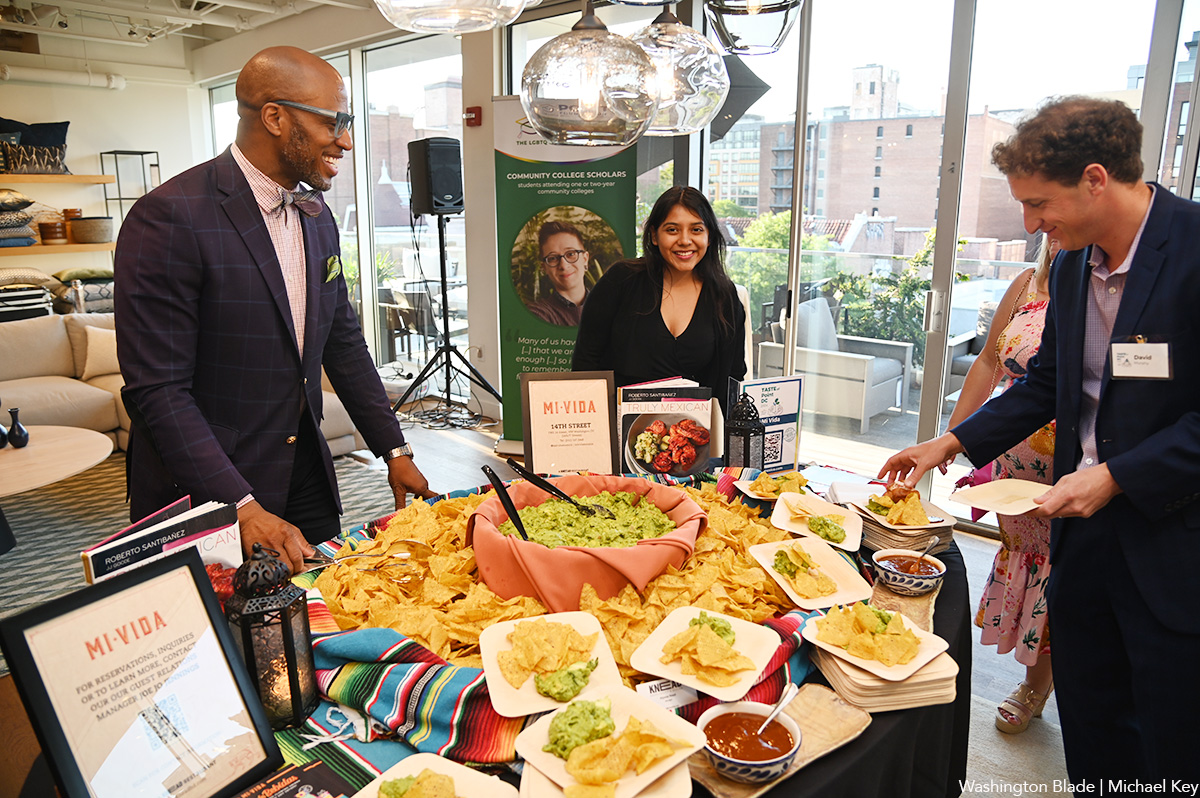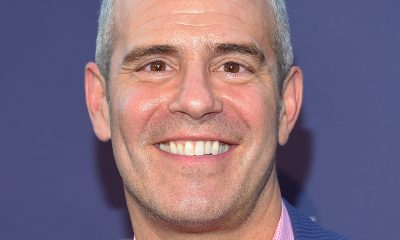Arts & Entertainment
‘Love Connection’ teaser with host Andy Cohen released
the game series premieres on May 25


(Screenshot via YouTube.)
FOX has released a first look at the “Love Connection” reboot with host Andy Cohen.
The dating antics have returned with Cohen helping singles find their match. Just like in the classic game show hosted by Chuck Woolery, contestants will get three chances to make a love connection.
While the show aims to bring people together, the preview shows there are plenty of mismatches before some contestants find the one.
“It was perfect. He had it all going on. Then he started talking,” one woman tells Cohen of her date.
Cohen also offers plenty of his own advice to contestants telling one man he has dating problems because he’s been “dating” his cat for the last three years.
“Love Connection” premieres May 25 on FOX.
Theater
Timely comedy ‘Fake It’ focuses on Native American themes
Arena Stage production features two out actors

‘Fake It Until You Make It’
Through May 4
Arena Stage, 1101 Sixth St., S.W.
Tickets start at $59
Arenastage.org
A farce requires teamwork. And Larissa FastHorse’s “Fake It Until You Make It” now at Arena Stage is no exception.
The timely comedy focuses on Native American nonprofits fractiously housed in a shared space. Friction rises when rivals River (Amy Brenneman), a white woman operating in the Indigenous world, goes up against the more authentic Wynona (Shyla Lefner) to win a lucrative Native-funded grant.
While Brenneman (best known for TV’s Judging Amy) is undeniably a big draw, it takes a group collaboration to hit marks, land jokes, and pull off the well-executed physical comedy including all those carefully timed door slams.
As members of the six-person “Fake It” cast, Brandon Delsid and Eric Stanton Betts, both out actors of partly indigenous ancestry, contribute to the mayhem. Respectively, Delsid and Betts play Krys and Mark, a pair of two-spirited Native Americans who meet farcically cute and enjoy one of the play’s more satisfying arcs.
For Krys, every attractive man is a potential next fling, but when Mark, handsome and relatively reserved, arrives on the scene, it’s something entirely different.
Both onstage and sometimes off, Betts plays the straight man to Delsid’s waggishness. But when it comes down to real life business, the friends are on the same page: not only are the L.A.-based, up-and-coming actors intensely serious about their film and stage careers, but they’re also particularly engaged in the themes of Indigenous People found in “Fake It.”
On a recent Wednesday following a matinee and an audience talkback, they were ready for a phone interview.
In establishing whose voice was whose, Delsid clarified with “I’m the one who sounds a little like a Valley girl.”
WASHINGTON BLADE: Brandon, you’ve been with the show since its early work-shopping days in 2022 and through its debut in Los Angeles and now Washington. Have things evolved?
BRANDON DELSID: Definitely. I’ve grown up in the last couple of years and so has my character; it’s hard to know where I end and Kry begins. There’s been a real melding.
Eric and I are both queer, and to get to play these roles that are so human, imperfect, sexy, and interesting is really joyful.
As queer artists you don’t always get the chance to do work like this. So many stories are queer trauma, which is incredibly important, but it’s liberating to feel joy and ride it off into the sunset, which, without revealing too much, is kind of what we get to do.
BLADE: There’s some race shifting in “Fake It” particularly with regard to “pretendian” (a pejorative term describing a person who has falsely claimed Indigenous status).
ERIC STANTON BETTS: The last few years I’ve been on a journey with my cultural identity and place in the world. I’m a mixed BIPOC artist, my dad is Black and Native American by way of the Cherokee tribe and my mom is white.
Since 2020, I’ve tried to figure out where I belong in this cultural history that I haven’t had a tie to throughout my life; it’s gratifying to find my way back to my indigeneity and be welcomed.
In the play, race shifting is introduced through farce. But it’s never in a disrespectful way; it’s never mocked or done in a way to take away from others. The playwright parallels race shifting with gender fluidity.
DELSID: But in life, there are people posing as Indigenous, actively taking grants, and the play goes there, we don’t hold back. Larissa, our playwright, has made it clear that she’s not trying to figure it out for us. With that in mind, we hope people leave the theater interested and curious to learn more.
BLADE: Mark arrives kind of the middle of some crazy drama, bringing along a jolt of romance.
BETTS: Yeah, when I show up, we’re all sort of shot out of a cannon, struggling to keep up with the initial lie.
DESLID: A very gay cannon.
BLADE: What’s up next for you two?
BETTS: Both Brandon and I are up for the same part in a TV pilot, so one of us may be getting some very good news. I also have a Tyler Perry film coming out soon [he plays a model, not an unfamiliar gig for Betts].
DELSID: Coming up, I have a recurring part on HBO’s “The Rehearsal,” and a supporting part in “June and John,” a John Besson film. But doing “Fake It Until You Make It” in L.A. and now D.C. has been a special time in our lives. It’s 23/7 togetherness. There’s that hour for sleep.

Point Foundation will host its annual “Taste of Point Reception” on Wednesday, May 7 at 6:30 p.m. at Room & Board.
The popular event will take place on the top floor and outdoor terrace at Room & Board, featuring small plates from area restaurants, hand-crafted cocktails from local mixologists, and a speaking portion where guests will hear directly from Point Foundation scholars. This year, Point is supporting a record-breaking class of 755 scholars and guests’ support will allow Point to continue its mission. Point Foundation is the nation’s largest scholarship-granting organization for LGBTQ students of merit.
Tickets are tax deductible and can be purchased at Point’s website.

Friday, April 25
Trans Discussion Group will be at 7 p.m. on Zoom. This group is intended to provide an emotionally and physically safe space for trans* people and those who may be questioning their gender identity/expression to join together in community and learn from one another. For more details, email [email protected].
Go Gay DC will host “LGBTQ+ Community Happy Hour” at 7 p.m. at Uproar Lounge and Restaurant. This event is ideal for making new friends, professional networking, idea-sharing, and community building. This event is free and more details are available on Eventbrite.
Saturday, April 26
Go Gay DC will host “LGBTQ+ Community Brunch” at 11 a.m. at Freddie’s Beach Bar & Restaurant. This fun weekly event brings the DMV area LGBTQ+ community, including Allies, together for delicious food and conversation. Attendance is free and more details are available on Eventbrite.
Black Lesbian Support Group will be at 11 a.m. on Zoom. This is a peer-led support group devoted to the joys and challenges of being a Black lesbian. You do not need to be a member of the Beta Kappa Chapter or the Beta Phi Omega Sorority in order to join, but they do ask that you either identify as a lesbian or are questioning that aspect of your identity. For more details, email [email protected].
Sunday, April 27
“Trans Open Mic and Author Talk with Jeanne Thornton” will be at 5 p.m. at Busboys and Poets 14th & V. It’s a difficult time for trans people in the USA, and Jeanne would like to extend the opportunity to local trans fiction writers to build community by coming on stage and sharing their work as part of an opening “open mic” to this event. There are spaces for up to 6-8 readers to share work of up to five minutes each. If you are interested in reading, please select the “Open Mic Ticket” and find Jeanne before the show at 4:30 p.m. The reading will be arranged on a first come, first served basis on the night of the event. For more details, visit Eventbrite.
Monday, April 28
“Center Aging Monday Coffee & Conversation” will be at 10 a.m. on Zoom. This is a social hour for older LGBTQ+ adults. Guests are encouraged to bring a beverage of choice. For more details, email [email protected].
Queer Book Club will be at 7 p.m. on Zoom. This month’s reading is “All Systems Red and Artificial Condition (The Murderbot Diaries Book 1 & 2)” by Martha Wells. For more details, email [email protected].
Tuesday, April 29
“OutPro Meaningful LGBTQ Networking” will be at 6 p.m. at Number Nine. Out Pro creates an environment that is welcoming to the full diversity of the LGBTQ community, as well as supportive allies. Guests are encouraged to embrace purposeful networking with the goal of helping connect people with opportunities. If you’re hiring, please come and meet motivated, aspiring LGBTQ professionals. As always, our events warmly welcome community allies. For more details, visit Eventbrite.
Wednesday, April 30
Job Club will be at 6 p.m. on Zoom. This is a weekly job support program to help job entrants and seekers, including the long-term unemployed, improve self-confidence, motivation, resilience and productivity for effective job searches and networking — allowing participants to move away from being merely “applicants” toward being “candidates.” For more information, email [email protected] or visit thedccenter.org/careers.
Thursday, May 1
API Queer Support Group will be at 7 p.m. on Zoom. This is a support group for the Asian and Pacific Islander queer community. For more information, email [email protected].
Virtual Yoga with Charles M. will be at 7 p.m. on Zoom. This is a free weekly class focusing on yoga, breath work, and meditation. For more details, visit the DC Center for the LGBT Community’s website.
-

 Federal Government3 days ago
Federal Government3 days agoHHS to retire 988 crisis lifeline for LGBTQ youth
-

 Opinions3 days ago
Opinions3 days agoDavid Hogg’s arrogant, self-indulgent stunt
-

 District of Columbia3 days ago
District of Columbia3 days agoD.C. police seek help in identifying suspect in anti-gay threats case
-

 Virginia3 days ago
Virginia3 days agoGay talk show host wins GOP nom for Va. lieutenant guv










